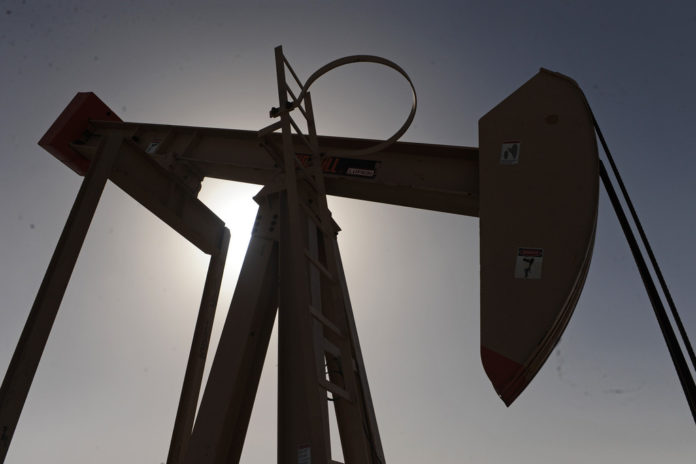
NEW YORK – Oil dropped in New York as rising Spanish borrowing costs pushed the dollar higher, adding to concern that Europe’s debt crisis will curb crude demand.
Futures fell as much as 1.5 percent in New York after the Spanish 10-year bond yield rose to a euro-era record of 7.14 percent. Greece’s New Democracy and Pasok parties won enough seats to form a majority in the 300-member parliament, according to an official projection.
Money managers cut bullish oil wagers for a sixth week, according to the Commodity Futures Trading Commission’s Commitment of Traders Report.
“Investors should remain cautious until Greece forms a government that could stabilize the markets for the short-medium term,” Myrto Sokou, an analyst at Sucden Financial Ltd. in London, said by e-mail.
Oil for July delivery fell as much as $1.38 cents to $82.65 a barrel in electronic trading on the New York Mercantile Exchange and was at $82.84 at 1:35 p.m. London time.
Brent crude for August settlement dropped $1.40 cents to $96.21 a barrel on the London-based ICE Futures Europe exchange. The front-month European benchmark contract was at a $13.15 premium to West Texas Intermediate, down from $13.28 on June 15.
The Dollar Index, which tracks the U.S. currency against those of six trading partners, rose as much as 0.3 percent. A strengthening dollar pushes up the cost of commodities priced in the U.S. currency.
Oil in New York has technical support along its 200-week moving average, around $80.65 a barrel today. Futures halted last week’s decline near that indicator. Buy orders tend to be clustered close to chart-support levels.
Saudi successor
“The victory of the austerity program’s supporters in the Greek parliamentary elections has lent a modicum of buoyancy to crude oil prices,” Eugen Weinberg, head of commodity research at Commerzbank AG in Frankfurt, said in a note. “That said, some of these gains have already been shed again, underlining the continuing skepticism among market players.”
The death of Crown Prince Nayef bin Abdulaziz Al Saud in Saudi Arabia, the world’s largest crude exporter, raised the issue of succession for the second time in less than a year. Nayef’s death leaves Prince Salman bin Abdulaziz as a leading contender for the crown prince position, as the kingdom grapples with high youth unemployment and security issues, including the threat of al-Qaeda militants and historic political change in the Middle East.
The kingdom will ensure adequate supply in the global crude market, Oil Minister Ali al-Naimi said in a June 15 interview, a day after the Organization of Petroleum Exporting Countries kept its output ceiling unchanged at 30 million barrels a day.
Saudi Arabia, OPEC’s largest oil producer, pumped 9.9 million barrels a day last month, according to data compiled by Bloomberg. Output from Iran, the second biggest, was 3.2 million a day, the data show.
“Supplies remain abundant and we have yet to see any evidence that OPEC is reducing supplies or the EU crude embargo against Iran is significantly curbing shipments,” Andrey Kryuchenkov, an analyst at VTB Capital in London said.
Diplomats began a two-day round of discussions in Moscow about Iran’s atomic program that officials say probably won’t yield enough progress to end the threat of military strikes against the Islamic republic.
Chinese, French, German, Russian, British and U.S. negotiators convened with their Iranian counterparts behind tight security at a hotel near Russia’s Foreign Ministry. The so-called P5+1 group will continue to seek Iranian acquiescence to suspend production of uranium enriched to 20 percent while Iran presses for relief from sanctions set to tighten from July 1, when a European Union oil embargo kicks in.
Fewer bulls
Hedge funds and other money managers reduced bullish bets on Brent crude by 9.9 percent, or 5,714 contracts, in the week ended June 12 to the lowest in more than seven months, according to data from ICE Futures Europe.
Speculative bets that prices will rise, in futures and options combined, outnumbered short positions by 52,037 lots, the London-based exchange said today in its weekly Commitment of Traders report. That’s the least since Oct. 25, according to data compiled by Bloomberg.
The same trend was evident in the U.S., where money managers cut bullish wagers on crude for a sixth week ahead of the Greek elections. Net-long positions fell by 2,541, or 1.9 percent, to 130,508 futures and options combined in the seven days ended June 12, according to data from the Commodity Futures Trading Commission’s Commitment of Traders Report.










